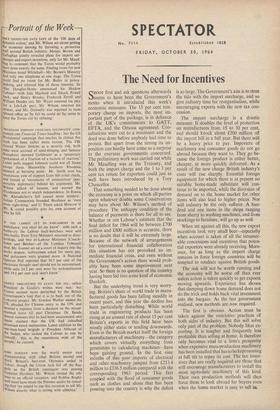—Portrait of the Week— ONLY EIGHTY-SIX DAYS 'LEFT of the
'100 days of dynamic action,' and Mr. Wilson set about getting the economy moving by throwing a protective Wall around British industry. Messrs. Brown and Callaghan jointly revealed plans for import sur- charges and export incentives, only for Mr. Maud- hug to comment that the Tories would probably have done exactly the same. Finding room for new Ministers taxed Whitehall—Mr. Brown's Ministry had only one telephone at one stage. The Tories could find no room for Mr. Butler in policy- Making, and relieved him of those interests. Sir Alec Douglas-Home announced his Shadow Cabinet—with lain Macleod and Enoch Powell back, and Henry Brooke, Frederick Erroll and William Deedes out. Mr. Wyatt renewed his plea for a Lib-Lab pact, Mr. Wilson renewed his refusal, and Mr. Donnelly was reported to have refused office as 'he felt he could do far more to keep the Tories out by refusing.'
PRESIDENT JOHNSON CRITICISES GOLDWATER' COM- Inented one Financial Times headline: but the US Presidential campaign that reaches its climax this Week has been rather more vicious. The FBI cleared Walter Jenkins as a security risk, both sides were accused of mud-slinging, and Senator Humphrey damned Goldwater as a 'temporary spokesman of a fraction of a faction of reaction.' Latest polls suggest Johnson could win all States except three. Meanwhile Southern Rhodesia teetered at bursting point: Mr. Smith won his unanimous vote of support from 600 tribal chiefs, and hinted at 'mountains of ammunition' (pre- sumably diplomatic) behind his arguments. Mr. Wilson talked of treason, and warned the lthodesians not to snatch independence. In Russia Mr. Khrushchev's fall caused more mystery : Italian Communists branded Brezhnev as 'even ttlyre right-wing,' and U Thant asked Moscow if
Mr. K could possibly give his own account of Why he fell.
*
Ir. YOU CANNOT GET TO PARLIAMENT in an ambulance, you must let me know': with such a battle-cry the Labour back-benchers were sent into battle. Four Tory Ministers returned to direc- torships, and two ex-Labour Ministers (Creech- Jones and Belcher—of the Lynskey Tribunal) died. Mr. Gunter set up a court of inquiry into the docks dispute, railwaymen asked for more pay, and policemen were granted more. A National ()Pinion Poll reported that 56.7 per cent of the electorate thought steel should not be nationalised. While only 24.2 per cent were for nationalisation and 19.1 per cent said 'don't know.'
*
NANCE THREATENED TO LEAVE THE EEC, unless President de Gaulle's wishes were met: but Prance seemed more perturbed by the British Government's hint that it is to back out of the Concord project. Mr. Gordon Walker visited the '1•1S. pleaded for Chinese entry to the UN, and secured a reprieve from a decision on the mixed- Manned force • till past Christmas. Dr. Banda denied rumours that he had been assassinated, and Spain claimed that the UK had cancelled Promised naval manoeuvres. Latest addition to the °Ile-man-band brigade is President Abboud of the Sudan, who sacked the Cabinet to rule by himself : 'this is the unanimous wish of the People,' he claimed.
*
"N SURTEES won the -world motor race championship, with other Britons second and third. Britain's best-ever Olympics ended in Tokyo, though the Union Jack fell off the flag- pole as the British contingent was passing Emperor Hirohito. •Mr. Wilson invited the ath- letes to an official reception, and Robbie Bright- Well must have made the Premier quake by reveal- ing that 'we intend to use this occasion to tell Mr. Wilson exactly what is wrong with athletics.'


































 Previous page
Previous page